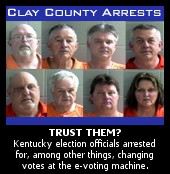by Linda Valdez
Imagine you had a really smart bomb - a genius bomb - that could blow up the leaders of every drug cartel in Mexico.
By the time the smoke cleared, a new pusher would be sitting in every cartel's big chair and the distribution networks would continue satisfying the demand of every junkie and recreational-drug user in America.
Mexico's drug cartels would continue to be, in the words of the Justice Department's National Drug Threat Assessment for 2009, "the greatest drug-trafficking threat to the United States."
Now, imagine a different weapon.
Consider the impact of eliminating the most profitable product the cartels sell.
All we have to do is legalize marijuana.
"Marijuana is the (Mexican cartels') cash crop, the cash cow," says Brittany Brown of the U.S. Drug Enforcement Administration's Washington office, which does not advocate legalizing pot.
Marijuana is cheap to grow and requires no processing. More than a million pounds of it was seized in Arizona in each of the past two years, according to figures provided by Ramona Sanchez of the DEA's Phoenix office. But those seizures were just a cost of doing business for multibillion-dollar drug lords. Marijuana continued to be widely available - and not just to adults.
Teens tell researchers that buying pot is easier than getting cigarettes or booze, says Bill Piper, director of National Affairs for the Drug Policy Alliance, which does advocate legalizing marijuana.
Cannabis vs. alcohol
Some argue that if you legalize marijuana there would still be a black market. They say that because the product is so cheap to produce, the black market could underprice legal pot and sell to kids. But consider what we know about alcohol.
• First, Prohibition didn't work.
• Second, even though alcohol sales are regulated, back-alley or school-yard sales of moonshine is not a billion-dollar problem.
• Third, alcohol, like its addictive killer-cousin tobacco, is taxed, which helps cover its costs to society.
Not so with marijuana.
After decades of anti-pot campaigns, from Reefer Madness to zero tolerance, so many Americans choose to smoke marijuana that the Mexican cartels have become an international threat to law and order.
Instead of paying taxes on their vice, pot smokers are enriching thugs and murderers.
"People who smoke pot in the United States don't think they are connected to the cartels," Brown says. "Actually, they are very connected."
American drug users help sharpen the knives that cartel henchmen use to behead their enemies and terrorize Mexican border towns.
Even marijuana grown in the United States, increasingly in national parks and on other public lands, is often connected to Mexican cartels, Brown says.
According to the Justice Department's 2009 assessment, cartels have "established varied transportation routes, advanced communications capabilities and strong affiliations with gangs in the United States" and "maintain drug-distribution networks or supply drugs to distributors in at least 230 U.S. cities." Including Phoenix and Tucson.
The DEA says cartels are "poly-drug organizations" that routinely smuggle cocaine, methamphetamine, heroin and precursor chemicals through our state.
"(But) marijuana generates the most profit," Sanchez says.
Removing a cash cow
Legalizing marijuana would not stop pushers from selling other, more lethal poisons. But taking away their most profitable product would hurt criminal organizations that have grown richer, more powerful and better armed during the so-called war on drugs that was first declared by President Richard Nixon.
Today's Mexican cartels "are as ruthless and brutal as any terrorist organization," says Sen. John McCain, R-Ariz., who is opposed to legalizing marijuana.
Their brutality is destabilizing Mexico. Several years after Mexican President Felipe Calderón bravely decided to take on the cartels, Mexico ranks with Pakistan as "weak and failing states" in a recent report by the United States Joint Forces Command. Why? Because Mexico's "government, its politicians, police and judicial infrastructure are all under sustained assault and pressure by criminal gangs and drug cartels," the report says.
While U.S. drug users enrich the cartels, the U.S. government pours huge amounts of money into defeating them.
The Bush administration sold Congress on the Merida Initiative, a multiyear, $1.4 billion aid package designed to provide training and high-tech assistance to help a besieged Mexican government combat the cartels.
Even in these days of gazillion-dollar bailouts, that's a chunk of change.
But consider this: According to a report last fall from the Government Accountability Office, the United States has provided more than $6 billion to support Plan Colombia since fiscal 2000. The goal of reducing processing and distribution of illicit drugs (mostly cocaine) by 50 percent was not achieved, the GAO found.
A GAO report from July 15, 2008, says that since fiscal 2003, the United States has provided more than $950 million to counternarcotics efforts in the 6 million square-mile "transit zone" that includes Central America, the Caribbean, the Gulf of Mexico and the eastern Pacific Ocean.
What did this buy?
"Despite gains in international cooperation, several factors, including resource limitations and lack of political will, have impeded U.S. progress in helping governments become full and self-sustaining partners in the counternarcotics effort - a goal of U.S. assistance," the report said.
Weary of the drug war
Our southern neighbors are getting tired of fighting our drug war.
Last month, the Latin American Commission on Drugs and Democracy called for a shift from the "prohibitionist policies based on eradication, interdiction and criminalization." Former Latin American Presidents Ernesto Zedillo (Mexico), Cesar Gaviria (Colombia) and Fernando Henrique Cardoso (Brazil) said the drug war has failed.
It was a tragically costly failure.
In testimony before Congress last June, Peter Reuter of the University of Maryland School of Public Policy and department of criminology, said, "It is likely that total expenditures for drug control, at all levels of government, totaled close to $40 billion in 2007."
He said about 500,000 people are in prison in the United States for drug offenses on any given day. Piper says 800,000 people a year are arrested on marijuana charges, the vast majority for simple possession.
Now, consider the possibilities of a new approach.
In 2005, economist Jeffrey A. Miron put together a report suggesting that if marijuana were taxed at rates similar to alcohol and tobacco, legal sales would raise $6.2 billion a year. California Assemblyman Tom Ammiano, a Democrat from San Francisco, is trying to get his state to legalize marijuana for adult use, set up a state licensing system and levy a tax that some say could raise $1 billion a year.
Let's be clear: Marijuana can cause dependency. It saps initiative and energy. It is unhealthful and smelly. I don't use it. But a lot of people do like the effects of this intoxicant, and they believe they can control its addictive properties. This is exactly why people drink margaritas during happy hour.
This is also why a war on drugs is unwinnable.
You'd think a country built on capitalism would understand basic laws of supply and demand. Instead, a failed and irrational national policy blunders forward, costing billions, incarcerating large numbers of people and enriching ruthless crime syndicates.
The cartels are not stagnant. They are growing in power and influence. In Phoenix, Mexican cartels are blamed for a dramatic rise in kidnapping and other violence.
Arizona Attorney General Terry Goddard says it may be only a matter of time before the kind of turf battles that are common in Mexico erupt along drug-transit corridors in Arizona. Goddard, who does not support legalization, says, "I do support an intelligent dialogue (on legalization)."
Brave but hopeless fight
Law enforcement has a smart-bomb approach to eliminating the bad guys.
Last month, the DEA announced Operation Xcellerator, a 21-month multi-agency effort aimed at the Sinaloan cartel. It culminated in more than 750 arrests and the seizure of 23 tons of drugs and $59.1 million in cash.
The police work involved was smart and courageous. After all, cartels torture and kill cops.
But while police were putting their lives on the line for the war on drugs, U.S. drug users were helping the cartels make up for any economic losses.
It's time to hit the bad guys where it really hurts.
Take away their cash cow.
Original here




 Do you know how many former Bush administration officials have been sentenced with jail time? The answer is a whopping eight, as MSNBC's Rachel Maddow pointed out Wednesday night.
Do you know how many former Bush administration officials have been sentenced with jail time? The answer is a whopping eight, as MSNBC's Rachel Maddow pointed out Wednesday night. Those of us who have demanded transparent voting systems because we understand that only the ability for complete citizen oversight and transparency can effectively counter those who would game elections, have been disingenuously criticized over the years as somehow questioning the integrity of the hard-working, honest election officials out there.
Those of us who have demanded transparent voting systems because we understand that only the ability for complete citizen oversight and transparency can effectively counter those who would game elections, have been disingenuously criticized over the years as somehow questioning the integrity of the hard-working, honest election officials out there.
 Still overcome with incredulity over former Vice President Dick Cheney’s interview on Sunday with CNN, The Daily Show’s Jon Stewart couldn’t resist Tuesday night taking a couple of shots at some of the eye-brow raising statements made.
Still overcome with incredulity over former Vice President Dick Cheney’s interview on Sunday with CNN, The Daily Show’s Jon Stewart couldn’t resist Tuesday night taking a couple of shots at some of the eye-brow raising statements made.
![[Minnesota Senate Standoff Plays Into GOP's Hands]](http://s.wsj.net/public/resources/images/NA-AW519_MINNES_D_20090316193013.jpg) Associated Press
Associated Press


